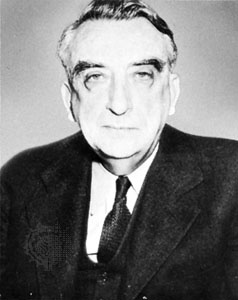Vinson, Fred M.
United States jurist
in full Frederick Moore Vinson
born Jan. 22, 1890, Louisa, Ky., U.S.
died Sept. 8, 1953, Washington, D.C.
 American lawyer and 13th chief justice of the United States, who was a vigorous supporter of a broad interpretation of federal governmental powers.
American lawyer and 13th chief justice of the United States, who was a vigorous supporter of a broad interpretation of federal governmental powers.Following completion of his legal studies at Centre College in Danville, Ky., in 1911, Vinson entered private practice in Louisa and quickly assumed an active role in local political affairs. In 1923 he was appointed to fill a vacancy in the U.S. House of Representatives. The following year he was elected to the seat as a Democrat and, except for one two-year period, served as a member of Congress until 1938.
As a congressman Vinson was recognized as an outstanding expert in tax and fiscal policy. From 1938 to 1943 he served as associate justice of the U.S. Court of Appeals for the District of Columbia. Between 1943 and 1945 he held a succession of high executive posts in emergency agencies of World War II, and in 1945 he became secretary of the Treasury in the cabinet of President Harry S. Truman. In this office he helped establish the International Bank for Reconstruction and Development and the International Monetary fund.
Upon appointment by President Truman, Vinson became chief justice of the U.S. Supreme Court on June 24, 1946. It is generally believed that his tact reduced personal animosities that had arisen on the court. As a judge his interpretation of the powers of the federal government often led him to reject claims of individual right asserted in opposition to the exercise of governmental authority. Perhaps his best-known opinions, however, are those upholding the rights of members of racial minorities under the equal protection clause of the Fourteenth Amendment to the Constitution. He spoke for the court in refusing to permit a state court to enforce a private agreement (“restrictive covenant”) to sell real property to white persons only (Shelley v. Kraemer, 1948). His opinion for the court in 1947 upheld the power of the federal courts to enjoin a strike in coal mines then under control of the federal government. He strongly dissented from the court's opinion holding unconstitutional the president's seizure of the strike-threatened steel industry during the Korean War (Youngstown Sheet & Tube Co. v. Sawyer, 1952).
- Baldwin I
- Baldwin II
- Baldwin III
- Baldwin II Porphyrogenitus
- Baldwin IV
- Baldwin, James
- Baldwin, James Mark
- Baldwin, Matthias William
- Baldwin, Robert
- Baldwin, Roger Nash
- Baldwin Spencer
- Baldwin, Stanley, 1st Earl Baldwin Of Bewdley, Viscount Corvedale Of Corvedale
- Baldwin V
- Baldy Mountain
- Balearic Islands
- baleen whale
- Bale, John
- Balenciaga, Cristóbal
- baler
- Bales, Peter
- Balewa, Sir Abubakar Tafawa
- Balfe, Michael William
- Balfour, Arthur James Balfour, 1st earl of, Viscount Traprain
- Balfour Declaration
- Balfour, Francis Maitland